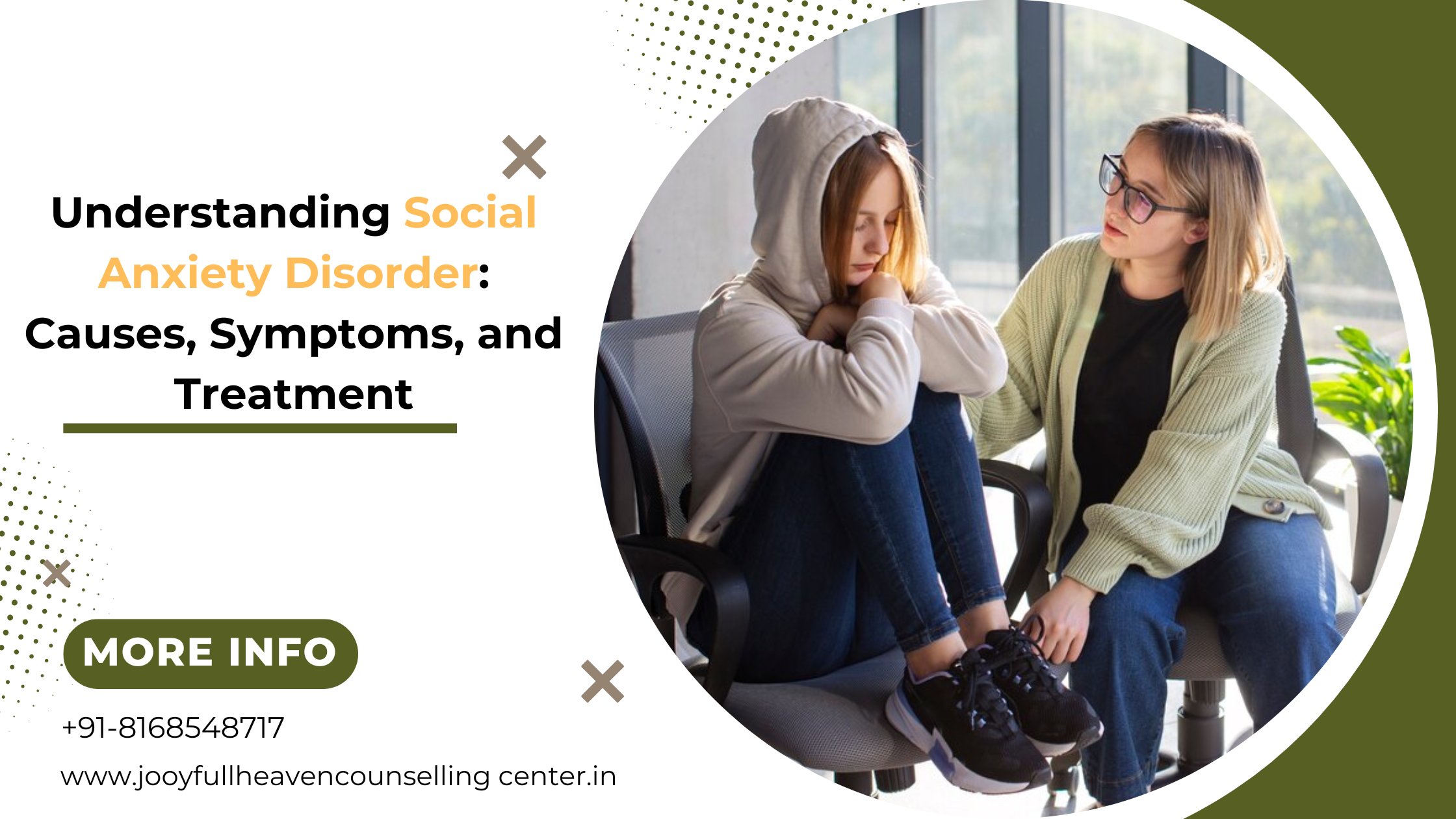
More aptly called SAD, social anxiety disorders represent some of the most common mental health disorders plaguing millions across the globe. It provokes drastic level of fear and discomfort in the minds of the individual in social settings and hence, can greatly impair his or her personal, academic, and professional life. This blog will explore in detail social anxiety disorder, its causes, symptoms, diagnosis, and effective treatment options, including therapy and counseling options such as family counseling and career counseling in Jaipur. The blog is going to tell about therapy, how a therapist helps manage social anxiety, and the quality of life improvements it brings into the person’s life.
The symptoms of social anxiety disorder once include obsessive-negative fear accompanied by anxiety and embarrassment upon the thought of being judged unfavorably by people at public appearances.
This blog explores the advantages that such a therapist would provide to that person seeking psychological therapy, as regards therapeutic effects that a therapist would have on patients suffering from social anxiety. What exactly is social anxiety disorder or phobia? The features of social anxiety disorder are mostly characterized by obsessive-minus fears and anxieties along with the feeling of embarrassment whilst only lifting a finger to think about being judged unfavorably by someone for public performance. This disorder is not simple shyness or nervousness; on many occasions, it will entail sufferers going as far as to avoid social gatherings entirely. They are consumed instead by worries about upcoming social events such as meeting new people, speaking in public, or eating in public.
While some shyness is okay, social anxiety disrupts and hampers daily functioning and manages to come and go with life in its painful episodes. In cases of uncomfortable situations, sweating, shaking, nausea, or a racing heart are typical physical representations of social anxiety disorder.
Social anxiety disorder can be observed in persons of any different age, background, or walks of life. It generally starts in childhood or adolescence, mainly from the age of 8 to 15. People can experience social anxiety, but the greater the number of risk factors, the greater the likelihood that social anxiety will develop:
Otherwise, social anxiety can have its very own distinct group of sufferers, like students, workers, and people who constantly interact in social or professional activities. Relationships, therefore, become affected, increasing social isolation and communication deficits.
Most often than not, social anxiety disorder is something quite overlooked, which is found by the NIMH to afflict almost 7% of the U.S. Acquired for some time in life, this prevalence appears extremely uniform through the different generations and cultures in myriad countries. Social phobia can be regarded as one of the most common of the major mental disorders since it quite often co-occurs with depression and/or generalized anxiety disorder and/or addiction.
Social anxiety disorder is so common that many social anxiety sufferers are too embarrassed to reach out for help or feel that they should just “tough it out”. Their way out is an option of professional counseling or therapy from a professional psychologist in Jaipur who will treat their social anxiety, giving them a chance to make their lives much better.
The general type of social anxiety is manifested in generalized manifestations, as in terms of situations, in which specific fear and discomfort are triggered, these can be as follows:
Shyness does not occur on a daily basis-like social anxiety disorder, which constitutes a constant refrain in one’s life. Both of these involve discomfort in social situations; however, shyness is very much part of personality, and in practice, it probably just makes an individual less comfortable in a situation, rather than derailing functional life, such as the forming of relationships. Shy personalities might even indulge in social activities after a little bit of self-persuasion.
Unlike that, social anxiety disorder is viewed as a clinical condition of a considerable amount of distress with clear symptoms manifesting on the physical level and avoidance behaviors. Such a person will go to superhuman lengths to keep himself as far away from other people as possible, including sometimes affecting work, schools, or even his personal life-gay or adverse social encounters.
If you suspect you may be suffering from social anxiety rather than just being shy, your best bet is to contact a therapist on the social anxiety list for clarification and treatment options.
Social anxiety disorder means all that slant of the affected psyche and related signs and symptoms. Some of the signs may include:
For someone with social anxiety, almost all of the preceding symptoms would be present frequently and, if considered significant for treatment, a visit to a therapist for social anxiety or a psychologist in Jaipur would be warranted.
This condition is diagnosed sometimes even exclusively by social anxiety therapists or psychologists. Diagnosis usually involves the following:
The truth is, there isn’t a single test that could rightly diagnose social anxiety disorder like all others. Instead, the diagnosis is based on a series of interviews, assessments, and observations by a health professional. This ensures that it is sure the diagnosis is right after ruling out other likely conditions.
This much would do to say that at times, a very exclusive diagnosis has been done by therapists-for-instance social anxiety therapists or psychologists. The most general diagnosis process overall involves:
In the present circumstances, there isn’t a single test sufficient to render a diagnosis of social anxiety disorder. Rather, the diagnosis is based on interviews, a few assessments, and observations by a qualified health professional. This ensures that any other possible disorders are excluded, and thus the psychologist will have an unambiguous diagnosis.
The most effective management of social anxiety disorder goes with a good treatment. In most cases, the treatments used for social anxiety disorder include the following:
The mainstay approach for most people with social anxiety is CBT. CBT or cognitive behavioral therapy teaches the patients to identify and challenge cognitive distortions that lead to anxiety and to work toward acceptance and flexible management of social situations. CBT is a particularly effective type of intervention for social anxiety disorder that enables the client to build individualized coping strategies.
Most of the drugs prescribed for social anxiety disorder can be classified as antidepressant, in particular the SSRI group of drugs that help to maintain serotonin levels in the brain and reduce a few selective symptoms of anxiety. Short duration treatment options include benzodiazepines for immediate therapy in borderline cases.
Exposure therapy essentially is gradually confronting dreaded social situations in a safe and controlled manner with the intention to get desensitized by the person’s triggers and most socially confronting situations over time.
Sometimes family counseling or group therapy is supportive to an individual suffering from social anxiety. Talking to someone who shares the same predicament brings relief as well as a sense of belonging.
This is important if you want to be treated for social anxiety disorder in Jaipur- finding the best therapist for social anxiety or psychologist in Jaipur who could probably help with the whole healing process.
The efficacy of psychiatric drugs may vary along the time continuum. Most people feel a little symptom relief from antidepressants in 2 to 4 weeks. Full effect, though, may take up to 6-8 weeks to be experienced. For a successful treatment outcome, drugs should always be administered together with psychotherapy.
Social Anxiety Disorder can be very difficult, but it can be treated. Consulting with a social anxiety therapist; family counseling; taking up career counseling in Jaipur are the possible ways of coping with the problem. The right combination of therapies, medications, and self-help strategies can liberate you from this state and encourage you to live a connected life. Those who suffer from social anxiety must always remember that they are not the only ones having this problem; help may be given outside the professional setting. Move today into healing.
1. Can we consider social anxiety disorder to be curable?
Even if socially anxious individuals are never completely “cured,” it can be managed quite effectively by means of therapy and medication. Improvement usually occurs in many of these people, and they tend to progress into successful life living.
2. Do social anxiety and social shyness mean the same thing?
Not really. Shyness is a tendency of a person’s nature while social anxiety is a psychological term inspired by the extremely strong fear of being told, humiliated or rejected by others, leading to avoidance and general distress in most social situations.
3. Is there therapy for social anxiety disorders?
Yes, and they are probably the best form of treatment for social anxiety disorders. One such highly effective treatment, which unfortunately is underused for reasons beyond the comprehension of both doctors and patients, is cognitive behavioral therapy (CBT)-which deals with recognizing and contesting negative thoughts and beliefs regarding oneself and towards social interaction, while practically teaching techniques to manage anxiety. Seeking therapy sessions for social anxiety can uplift an individual’s coping capability when in public.
4. Time period for the medication to liberate from social anxiety?
This answer will vary for drugs, but in general: One might experience some relief after “2 to 4 weeks” on the antidepressants, e.g. SSRIs. After about “6-8 weeks” on medication, full effect is expected. While on medication, it is very important to be in close contact with the physician for assessment of efficacy and management of side effects.
Also Read: How to talk to a therapist when you have social Anxiety?
